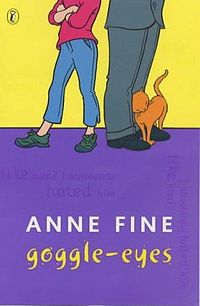- Goggle-Eyes
-
Goggle-Eyes 
2001 Puffin paperback editionAuthor(s) Anne Fine Country United Kingdom Language English Genre(s) Fiction Publisher Hamish Hamilton Publication date 23 March 1989 Media type Print (Hardback, Paperback) Pages 144 pp ISBN 0241126177 Goggle-Eyes is a children's novel by Anne Fine, first published in 1989. The book won the Carnegie Medal [1] and the Guardian Children's Fiction Award.[2] American editions are titled My War with Goggle-Eyes.[3]
Goggle-Eyes was adapted for television by the BBC in 1993.[4]
Contents
Plot summary
The story is told in the first person, by Kitty Killen. It is set in Scotland in the 1980s, when anti-nuclear protests were prominent in the news.
When Helen runs out of the classroom in distress, Mrs Lupey sends Kitty after her, despite the two not being particular friends. Kitty soon realizes that Helen dislikes the man her mother is going to marry, so she tells her the story of how she first loathed Gerald, her mother's boyfriend, and how she gradually got used to him, despite his anti-CND views. "Goggle-Eyes"' is the nickname Kitty gives Gerald, because of the way he stares ("goggles") at Kitty's mother. The story is told in a cloakroom cupboard during one morning, with occasional interruptions from Liz and Mrs Lupey.
The characters
- Kitty Killen, a Scottish schoolgirl, the narrator
- Rosalind "Rosie" Killen, Kitty's mother, a nurse
- Judith "Jude" Killen, Kitty's younger sister
- Gerald Faulkner, Rosalind's boyfriend
- Floss, the Killens' cat
- Helen "Helly" Johnston, a classmate of Kitty's
- Liz, Helen's best friend
- Mrs Lupey, the form teacher
- Josie, Beth, Ben and others, CND protesters
- Inspector McGee, head of the police presence at the protest
Literary significance and reception
Goggle-Eyes was awarded the Carnegie Medal for 1989 and the Guardian Children's Fiction Award in 1990, the two most prestigious British awards for children's literature. It was also shortlisted for the Smarties Award in 1990 and the German Youth Literature Prize in 1993.[5]
Television adaptatation
Goggle-Eyes was adapted for television by the BBC as a four-episode mini-series, which was broadcast in 1993. It starred Honeysuckle Weeks as Kitty.[4] The screenwriter, Deborah Moggach, won the Writer's Guild Award for Best Adapted TV Serial. As the anti-nuclear protests had declined after the end of the Cold War, the political issue was changed to a more general 'green' one as being more topical.[6]
References
- ^ Carnegie Living Archive
- ^ Guardian Children's Fiction Prize relaunch
- ^ Goggle-Eyes at Fantastic Fiction
- ^ a b Goggle-Eyes at the Internet Movie Database
- ^ Anne Fine's Awards
- ^ Author's foreword to the Longman educational edition of Goggle-Eyes, 1996
Awards Preceded by
A Pack of LiesCarnegie Medal recipient
1989Succeeded by
WolfCategories:- 1989 novels
- British children's novels
- Novels set in Scotland
- Carnegie Medal in Literature winners
Wikimedia Foundation. 2010.
